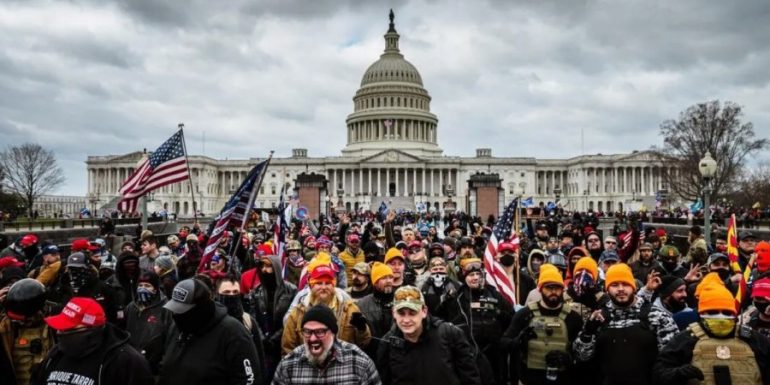In the summer of 2015, America got a "taste" of how its future could evolve. The U.S. military has conducted a routine exercise in the south that has sparked a domino of conspiracy theories, particularly in Texas.
Some believed that these high schools were a harbinger of a Chinese invasion; others thought it would coincide with an asteroid impact. The exercise, called Jade Helm 15, involved "internal elimination of local armed guerrillas," according to one of the right-wing dark fantasy websites.
Greg Abbot, the Republican governor of Texas, took these nonsense seriously. He ensured that the 1.200 federal soldiers were closely monitored by the Texas National Guard. In this strange incident, which took place a year before Donald Trump became the Republican candidate for the US presidency, we see the "germ" of a dissolution of America.
As with any warning of impending civil war, the mention of just one more American civil war sounds extremely destructive - like Mazestix's persistent warnings in the Asterix comics that the sky is about to fall on the Gauls. Many times there has been a wrong prediction for the dissolution of America.
However, a number of recent books present a worryingly convincing hypothesis that the warning signs are stronger than ever since 1861. The French philosopher Voltaire once said that "those who can make you believe irrationality can make you commit atrocities." . As Barbara Walter of the University of California shows in her handbook "How Civil Wars Start", the US democracy today "tickers" all the wrong boxes.
Even before Trump's victory in the 2016 presidential election, political analysts warned of the erosion of democracy and the shift to authoritarianism. The division caused by the failed coup attempt on January 6, 2021 has sent democracy on dangerous new paths.
Polls suggest most Republicans believe, without evidence, that Democrats stole the election with the support of the so-called "deep state," the Chinese government, Venezuela's rigged voting machines, or a combination of these.
The book, "This Will Not Pass," written by New York Times reporters Jonathan Martin and Alexander Burns, states that Joe Biden told a senior Democrat that "I really hope (my presidency) is effective." "If it is not, I am not sure we will have a country." The fact that a US president could say something so eschatological without making a big impression shows how much this kind of fear has become routine.
In 1990, the CIA correctly predicted that Yugoslavia would disintegrate within two years as its policies hardened and turned into ethnic groups. In 2022, the two parties in America are increasingly divided into racial and identity lines. Republicans are white, living in small towns and rural areas - the party now owns in Congress only one truly urban area on New York's Staten Island. Democrats are now almost entirely bourgeois and multinational. The habits of a normal democracy in which the losing party forms a loyal opposition are now being lost.
More than a third of Republicans and Democrats today believe that violence is justified to achieve their political goals, while in 2017, the year Trump took office, it was less than a tenth. Trump's rhetoric has opened the door to separatist sentiment.
When it loses a party, its voters feel that America is being occupied by a foreign power. America, Walter points out, has turned into "a factional anocracy" - an intermediate state between totalitarianism and democracy - which is "rapidly approaching the stage of open insurrection". Violence haunts America's political language. As Canadian novelist Stephen Marche writes in his book The Next Civil War, which is a very imaginative lament for America's impending disintegration, the country is "far from a spectacular act of violence from a national crisis."
How did America get here? Choose any of the sad milestones you want - Newt Gingrich's scorched earth approach when he was polarizing Speaker of the House of Representatives in the 1990s, Supreme Court Judgment 5-4 giving the 2000 election to George W. Bush America's uncontrollable response to the 11/XNUMX terrorist attacks, the FBI fatal investigation into the almost comically trivial emails of Hillary Clinton, the Democrats who attributed Trump's victory to Vladimir Putin, Trump's attempt to uproot any guardrail or failure of Congress to unite for the need to punish a violent attack against him. America's democratic setback is similar to Ernest Hemingway's famous bankruptcy remark: "Gradually, then suddenly."
Burns and Martin offer a painstakingly researched and often enlightening chronicle of America's recent political degeneration. Many of them are summarized in the absence of character. As the dust settled on last year's attack on the Capitol - carried out by a mob of almost entirely retired white police officers, nurses, real estate contractors, doctors, lawyers and small business owners carrying flags, loops, Smith & Wesson pistols, devices, handcuffs, chemicals and knives-, Republican leaders blew up with relief. The Capitol may have been filled with glasses, its corridors smeared with feces.
By Edward Luce -Financial Times
